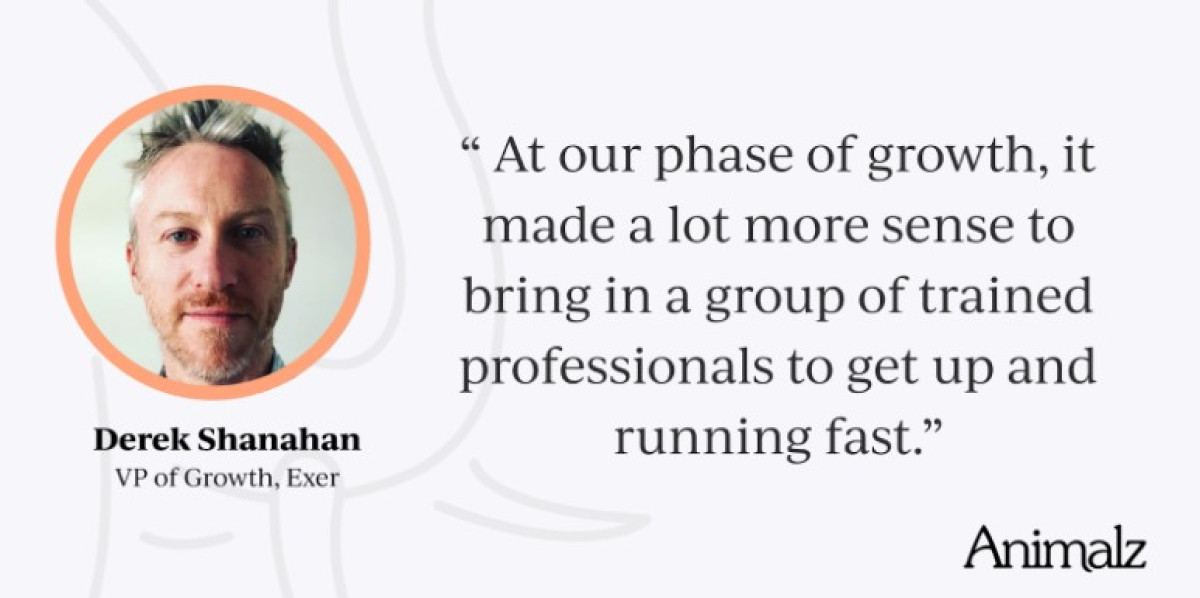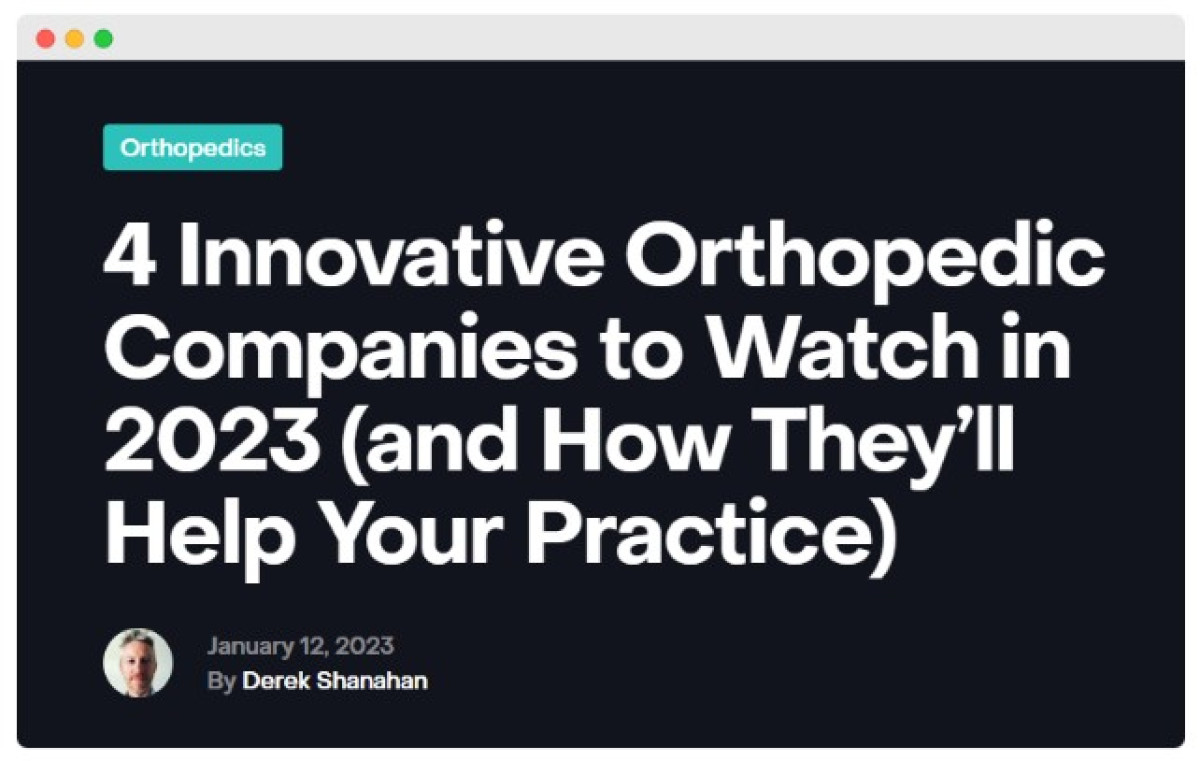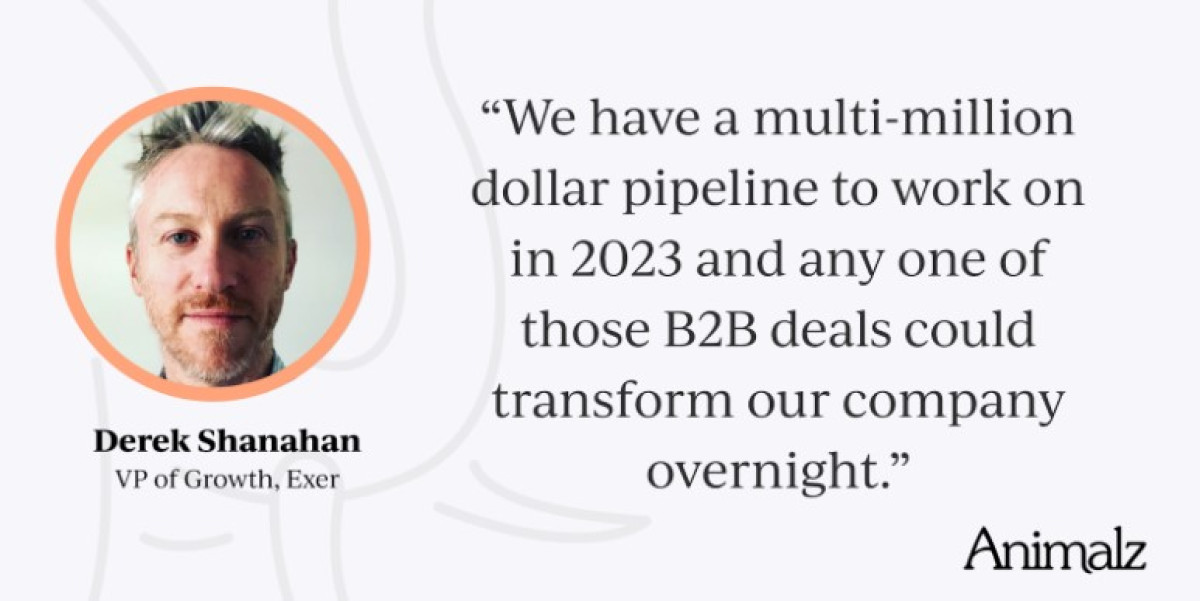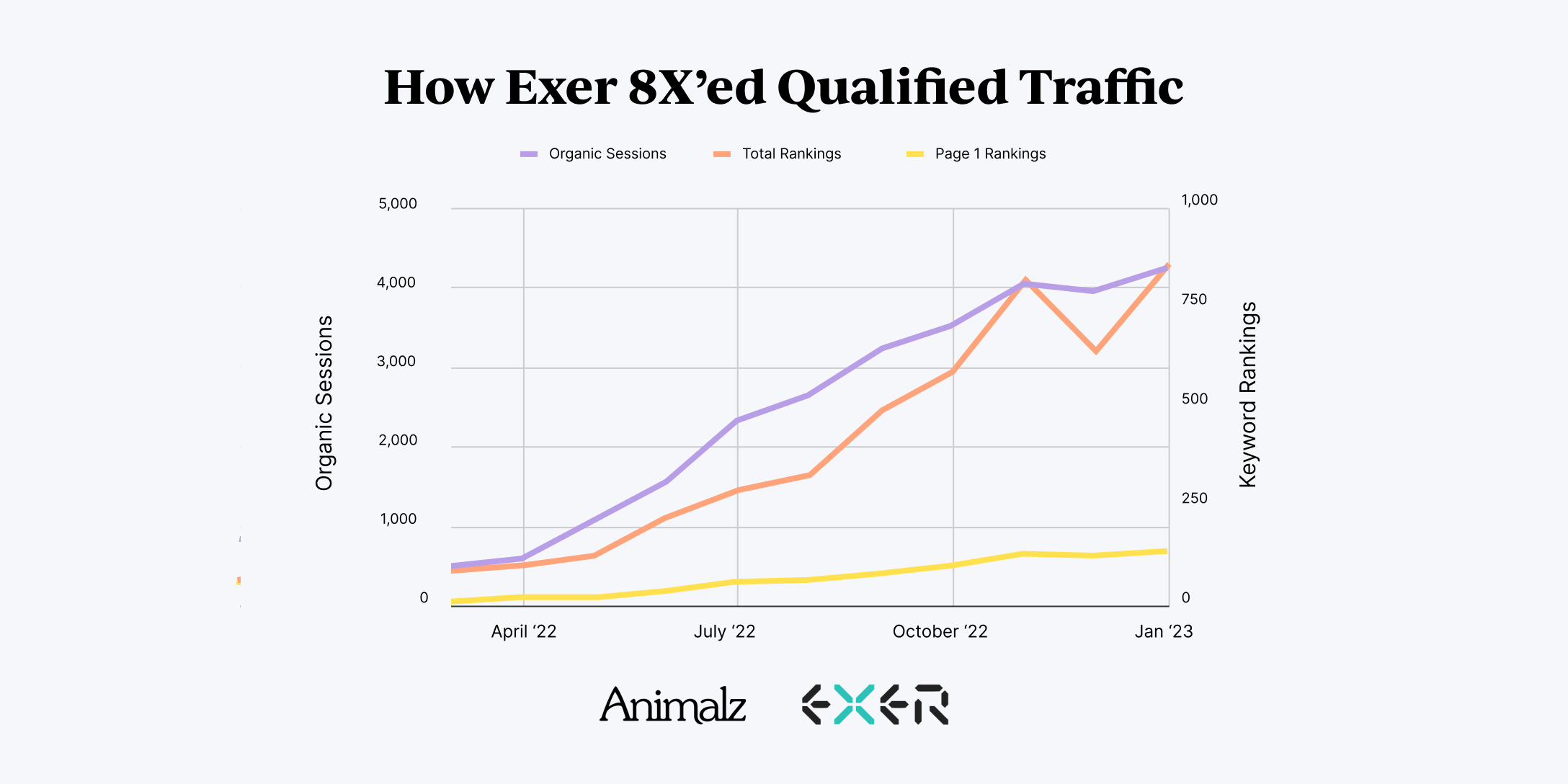Regulatory changes that create new, uncontested markets is a tale as old as the world of startups. But that doesn’t make these blue ocean opportunities any easier to exploit, especially for startups like Exer Health, a motion analysis AI tool, that operate in the healthcare niche. Long B2B sales cycles, a discerning medical audience, and limited marketing resources all stood in the way of Exer Health’s growth.
Animalz worked with Exer Health to build SEO as an organic customer acquisition channel that will supplement consultative sales. Search traffic was to set the foundation for long-term growth and fill the sales pipeline.
For companies in a similar position, a lot can be learned from the tactics Exer Health and Animalz deployed: targeting a technical audience with business content, picking the low-hanging keyword fruit first, and differentiating content to attract qualified leads. And the fact that Exer Health 8X its search traffic in a year speaks to the strength of this approach.
Exer Health | Traffic Performance Month, Year Organic Sessions Keyword Rankings Page 1 Rankings March 2022 469 106 12 April 2022 541 122 15 May 2022 637 219 22 June 2022 1123 315 41 July 2022 1453 472 53 August 2022 1666 536 62 September 2022 2478 652 80 October 2022 2975 705 99 November 2022 4107 809 131 December 2022 3220 793 128 January 2023 4311 855 138
Overcoming the Challenges of an Emerging Healthcare Market
Exer Health is trying to win in an emerging market of healthcare providers interested in technical solutions related to providing patients with remote therapeutic monitoring services.
It’s a classic case of the blue ocean opportunity, an uncontested market that’s ripe for the taking. Qualified healthcare providers can use various remote therapeutic monitoring billing codes to get reimbursed by insurance providers like Medicare and private payors. These codes, which went live on January 1, 2022, opened up a new source of revenue for these businesses.
Exer Health enables physical therapists (PTs) and orthopedic surgeons to offer remote therapeutic monitoring (RTM) services to their patients alongside typical in-person evaluations. Patients use the Exer Health smartphone app to record themselves practicing specific exercises.
Exer Health’s software provides motion health assessments
The app uses AI to analyze patients’ movements, then delivers this data to clinicians as visual dashboards. These insights are then used to inform a customized and more effective approach to the patient recovery process.
But there are various marketing and business challenges Exer Health has to overcome to win in this field.
1. Long and Complicated Sales Cycles in the Healthcare Niche
B2B sales in the healthcare industry require a great deal of trust and take a long time to develop. And, as with any new service, there were various teething troubles to overcome.
For instance, the company initially focused on marketing to physical therapists, only to discover that these clinicians had a hard time billing RTM codes and getting reimbursed for using Exer Health. So Exer Health pivoted to orthopedic surgeons, who proved to be more successful in billing RTM codes. As language around these codes was updated in 2023 to provide clarity around physical therapists who use them, Exer is now opening back up into that market.
And as a new brand in the market, Exer Health must work exceptionally hard to build trust and shorten the sales cycle. This requires a strategic approach to content creation that not only educates their target audience but also demonstrates their expertise and credibility in relevant niches.
2. Highly Selective Medical Audience
Exer Health’s target audience isn’t your typical internet user. They are medical professionals, such as physical therapists and orthopedic surgeons, who don’t rely on Google as the primary destination for their research needs.
Instead, they seek information on academic journal search engines like PubMed for peer-reviewed research. And any non-medical SEO content will need to be well-researched and thorough to ensure that every touch point with its target audience builds Exer Health’s credibility.
3. Limited Marketing Resources
As an up-and-coming startup, Exer Health had limited SEO and marketing resources. There was no topical authority in relevant niches. Also, the company had low domain rating compared to its main content competitors and nearly non-existent content library.
Compounding the problem, Exer Health had a tight budget and only one person dedicated to managing content: Derek Shanahan, their VP of Growth. While he recognized the need to invest in content marketing, hiring an in-house content person was too costly and time-consuming.
As he explains, “People underestimate how much time and energy it takes to train people and ensure they maintain momentum. At our phase of growth, it made a lot more sense to bring in a group of trained professionals to get up and running fast, and to execute on a specific strategy with very little need for oversight.”

To meet their goal of creating a low-maintenance content engine that exposed their brand to a wide audience, built trust with key decision-makers, and brought in qualified leads, Exer Health turned to Animalz for help.
Go-To-Market Strategy: Consultative Sales and SEO
Go-to-market strategies in the B2B healthcare niche are complex and Exer Health is no exception to this rule. Animalz was to work on SEO and build a content engine. Exer Health’s team, meanwhile, would spend 2022 talking to potential customers, participating in industry events, and doing consultative sales using referrals from investors and other parties. And the insights gained from these engagements would be used to continuously refine the product.
Exer Health treats SEO as a long-term growth lever. Derek explains that they wanted to do the early SEO work and position their “brand as a thought leader of a sort by going after evergreen topics that would be relevant even five years from now. We wanted someone to take over this part and then allow us to focus on consultative sales. Our team wanted to check the box on delivering strong search and educational content, while we are on the front lines, refining the product and customer experience.”
And Animalz has put in place an SEO strategy that helped Exer Health attract target readers and earn their trust. Here are some principles applied throughout this process.
1. Target Technical Audience with Business Content
A technical audience like physical therapists and orthopedic surgeons can be attracted with business-focused content. Companies don’t necessarily have to produce highly technical content if they have limited human and financial resources. As we explained previously, going after a technical audience can be done using one (or all) of the following content lanes:
Lane #1: Technical content for technical people
Lane #2: Business case content for managers and executives
Lane #3: Use-case content for technical people and executives alike
We then opted for a variation of more accessible business case content. Our focus was on marketing, business, and tech topics that fulfill two criteria:
They are relevant for our target audience of clinicians and clinicians-turned-executives.
They could be covered reasonably well by non-medical writers.
The topics that fulfilled these two criteria and could also showcase the value of Exer Health’s products were prioritized above all else. The end goal was to reach actual decision makers, which in this case were usually clinicians-turned-executives.
For instance, one of the articles educated readers on how staff burnout is hurting their physical therapy practices. And the next article dealt with how to prevent this burnout from happening in the first place. Animalz also produced pieces that go over the best orthopedic ads that can inspire the marketing strategies of our readers.
Dozens of other articles covered emerging technologies, industry trends, patient education tips, telehealth/telemedicine, remote therapeutic monitoring, and more. Many of these topics allowed us to position Exer Health as a tool for helping patients and creating new revenue streams for healthcare professionals.
Despite being relatively non-technical, coming up with these topics required researching online magazines (Medical Xpress, Orthopaedic, etc.), industry associations (APTA and AAOS), and various other venues where PTs and ortho surgeons get their news from. Each topic was then vetted for its organic traffic potential.

2. Pick the Low-Hanging Keyword Fruit First
Startups should ideally start their SEO journey by picking the low-hanging keyword fruit first. This means initially only going after long-tail, low-difficulty keywords. Once the site builds the topical authority and domain rating, it’s then safe to go after short-tail, high-difficulty keywords.
Exer Health also avoided keywords with seductively high search volume but mixed or unclear search intent. These keywords are not the best fit for the early stages of content engine growth when startups need more certainty that their keyword selection will pay off.
Animalz and Exer Health went after a wide range of evergreen topics of interest to physical therapists and orthopedic surgeons. Doing so ensures the company will enjoy steady organic traffic for years instead of depending on keyword seasonality. And Exer Health will get to see which topics perform particularly well and can then double down on those with more content.
3. Attract Qualified Leads With the Angles That Speak to Them
Generating leads with SEO means occasionally adding a twist to your content to attract readers with particular interests.
In the case of Exer Health, the qualified traffic was defined as PTs and ortho surgeons willing to test innovative products to help their patients and grow their business. This has shaped the way we generated topics and decided on angles.
For instance, the search intent behind the “orthopedic companies” keyword would require writers to produce a piece on the top orthopedic corporations based on their revenue. But for Exer Health, a twist to this angle would be to also produce the piece on top orthopedic companies specialized in emerging technologies, such as biologic augmentation, AI, 3D printing, and more.
This would bring forward-looking practitioners and executives to Exer Health’s site. The new angle would also make it far easier to introduce Exer Health as an innovative, AI-powered product that should be seriously considered.

4 Innovative Orthopedic Companies to Watch in 2023 (and How They’ll Help Your Practice)
Taking this approach means sometimes going after keywords with nearly zero search volume. But given the size of the B2B deals Exer Health was after, even a single lead could make SEO investments worth it.
And this approach paid off. Derek notes that “organic traffic has brought in several great leads. We have a multi-million dollar pipeline to work on in 2023 and any one of those B2B deals could transform our company overnight.”

He also observed that organic leads are of higher quality than leads sourced from referrals. “We get referrals from investors and other parties and we are grateful for that, but leads acquired through search are better. Those people don’t talk to us because someone told them to, but they are truly interested in us and what we have to offer,” says Derek.
It’s Time to Work the Pipeline
Blue ocean markets are incredibly lucrative opportunities for startups, but that doesn’t mean wins come easily. Various challenges stand in the way for new startups, such as long sales cycles, low brand recognition, and limited marketing resources. But companies like Exer Health show that a combination of consultative sales, SEO, and fast product iteration can yield amazing results.
By prioritizing business content and less competitive keywords, Exer Health leveraged SEO to build topical authority that attracts qualified leads. For companies targeting highly technical audiences in niche markets like healthcare, this approach is infinitely more valuable than creating content just for the sake of appearing in search results.
As Derek says, “This is exactly where we wanted to be. We are in a tough funding environment, but we always stayed lean and now also we have a significant pipeline to work with.”
